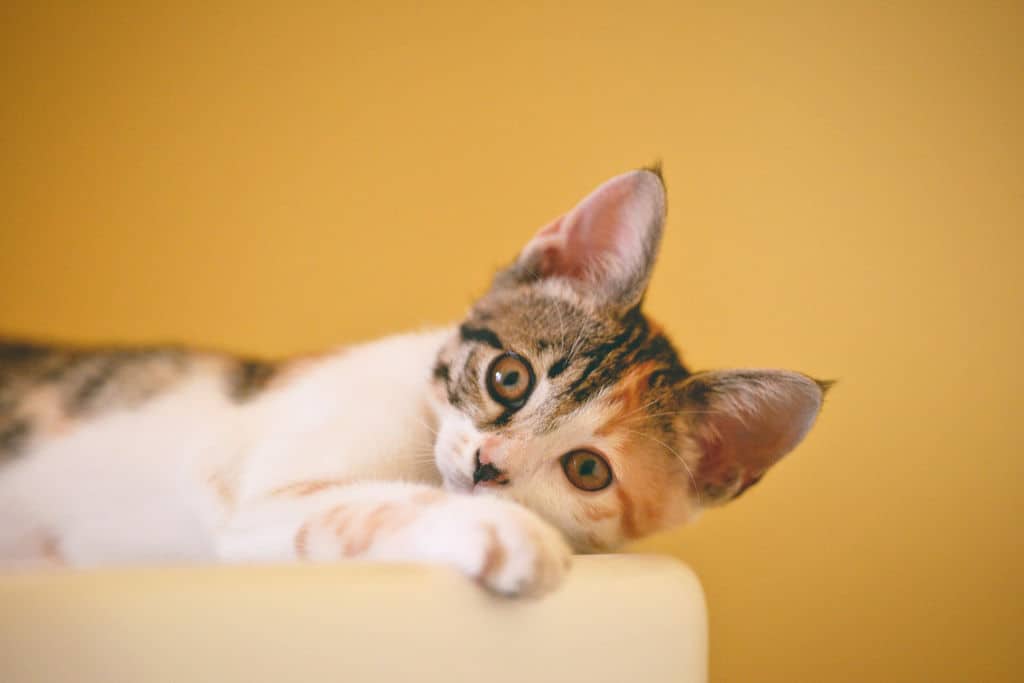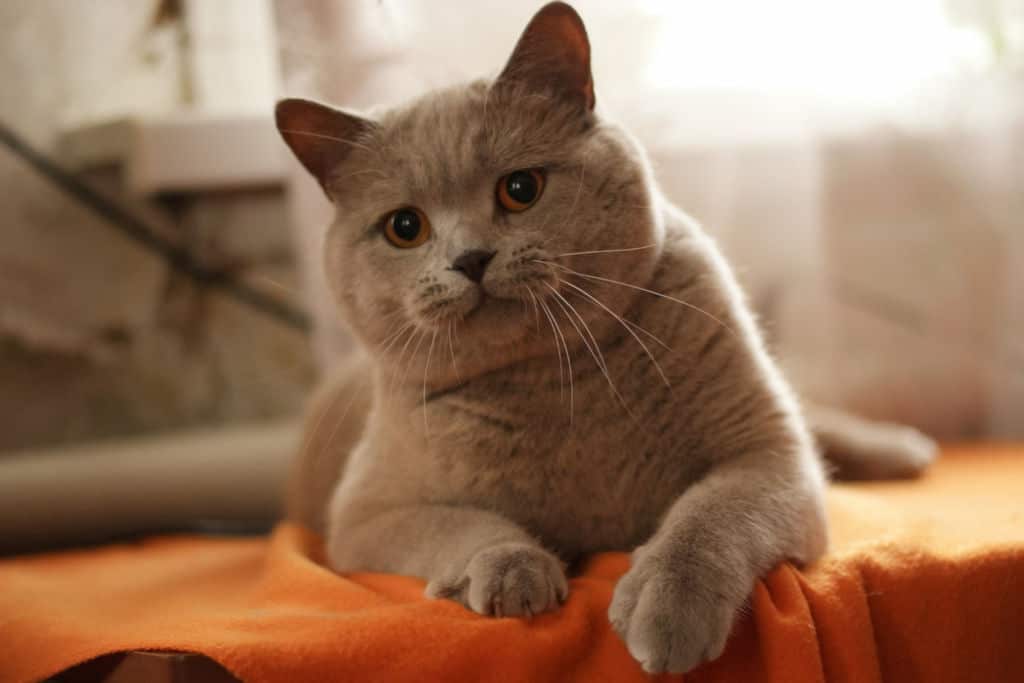Cats are social animals, and they have evolved to pay attention to the sounds of other cats. Consider the impact on your cat’s well-being before playing any cat sounds. Why?
This article explores why many cats react to cat sounds, whether they enjoy it, what they typically find comforting, and what they are frightened of.

Why Do Cats React to Other Cat Sounds?
As social animals, cats have evolved to pay attention to the vocalizations of other cats, as this information can be important for communication and social bonding.
When a cat hears the sound of another cat on a smartphone or computer, they may instinctively respond as if there is another cat nearby. This can lead to various behaviors, such as increased vocalization, tail twitching, or playfulness.
This is because the sounds of other cats can provide important information about their presence, social status, and mood.
One of my cats trills to play or to indicate that he wants to play when he hears another cat sound. In general, though, we try to avoid playing or mimicking cat sounds.
Regarding kitten sounds, your cat may be reacting to them instinctively. The adult cat hears a baby crying, possibly for food, comfort, or something else, and dashes over to try to assist or, at the very least, investigate.
Overall, cats’ reaction to other cat sounds on smartphones and computers can vary greatly, but it is often a reflection of their instincts and social behaviors.
Do Cats Enjoy Hearing Noises From Other Cats?
Cats have excellent hearing and can hear sounds at much higher frequencies than humans, up to 64,000 Hz. When cats hear the sounds of other cats, they may react in several ways depending on the situation and their individual personality.
If a cat is relaxed and appears to be enjoying the sounds, then playing cat sounds for them is unlikely to be cruel. However, if the cat is frightened or distressed by the sounds, it’s best to stop playing them.
Some cats may enjoy hearing noises from other cats, which can trigger their instincts and social behaviors. However, cats’ reactions to other cat sounds can vary greatly, and some cats may be frightened or indifferent to these sounds.
Playing kitten noises, though, is generally not a good idea to get the cat to come to you. They will try to find the kittens and may become highly stressed, as the adult cat’s maternal or protective instincts can be activated upon hearing kitten sounds. This might be why cats are particularly attracted to kitten noises, sensing the vulnerability and wanting to either nurture or investigate.
So, while hearing the sounds of other cats can be a natural and intuitive response for cats, the reaction will depend on the individual cat’s personality and the context in which the sounds are heard.
Which Sounds Do Cats Find Comforting?
Cats have individual preferences regarding sounds, just like people do. Some cats may enjoy the sound of birds chirping, while others may prefer the sound of a human voice. Some common sounds that many cats seem to enjoy include:
- Purring. The frequency of a cat’s purr ranges from 25 Hz to 150 Hz, and some studies suggest that this frequency can have a calming effect on cats and even promote healing. Many cats find the sound of purring to be soothing and calming. If you want to play a purring sound for your cat, you can play some of the sounds or videos mentioned below.
- Soothing music. Some cats may enjoy listening to soft, relaxing music. You can play classical music, jazz, or even lullabies for your cat to see if they enjoy it.
- Bird calls. Cats are natural predators, and they may be drawn to the high-pitched chirping sounds of birds. Play these sounds cautiously, though. Overexposure might lead to frustration if your indoor cat can’t chase the perceived prey.
- Running water. Many cats are fascinated by the sound of running water, such as a faucet or a fountain. You can play recordings of running water for your cat or install a fountain in your home.
- Crinkling paper. Some cats enjoy the sound of crinkling paper, especially when paired with treats or toys.
Remember that not all cats will enjoy these sounds, and some may be frightened. It’s always a good idea to observe your cat’s reaction to a new sound and adjust accordingly.

Suggestions of Music/Sounds Cats Will Enjoy
Cats do not experience music in the same way that humans do. Kittens’ heartbeat, voice, and acoustic ranges are different from ours. But if you haven’t tried giving your cat some cat-specific music to listen to, then you’re missing out.
There’s music made specifically for cats, such as Cozmo’s Air by David Teie:
Yes, music for cats is actually a thing. For example, David Teie has this website: https://www.musicforcats.com/ with many different types of cat music, or you can try Pandora’s Cat Music Station. Your cat may actually like this, and you might, too!
There are also videos your cats might enjoy. For example, I’ve heard some promising results about this video for cats:
Opt for videos with natural movements, such as birds fluttering or fish swimming, as abrupt, unnatural motions can be jarring for a cat.
Keep in mind that not all cats will react to this music. Depending on the cat’s personality, breed, and current mood or condition, some will ignore it and may not respond.
What Sounds Frighten Cats?
Cats have very sensitive hearing, and certain sounds can be frightening to them. Sudden, loud noises, such as fireworks, thunder, or the sound of an object being dropped, can startle cats and cause them to feel frightened.
Some cats may be scared by high-pitched sounds like a whistle or a vacuum cleaner.
The sound of sirens, such as those from police cars or fire trucks, can be frightening to some cats, and the sound of unfamiliar people or animals.
The sound of dogs barking can be frightening to cats, especially if they have had negative experiences with dogs.
Every cat is unique and may have different sensitivities to sounds. If your cat is frightened by a particular sound, it’s best to try to remove the source of the sound or help your cat find a safe and quiet place to retreat to.
Remember, if a sound is too loud or startling for you, it’s probably much more intense for your cat, given their acute sense of hearing. Always prioritize their comfort and well-being when introducing new auditory experiences.
FAQs
Does playing purring sounds do anything?
Purring sounds can have a calming effect on cats and can even promote healing. However, cats’ reactions to purring sounds vary greatly, and some may not respond to these sounds.
Why do some cats not react to cat sounds?
Some cats may not react to cat sounds because they are used to them or perceive them as background noise. Other factors like age, personality, and prior experiences can also affect their response.
Why do some cats like clicking noises?
Some cats may enjoy the sound of clicking noises because they associate it with positive experiences, such as being fed or receiving treats. Additionally, the sound may be reminiscent of the sound of prey, which can trigger the cat’s hunting instincts.
Alex, a passionate animal lover, has experience in training and understanding animal behavior. As a proud pet parent to two dogs and three cats, he founded AnimalReport.net to share insights from animal experts and expand his knowledge of the animal kingdom.




